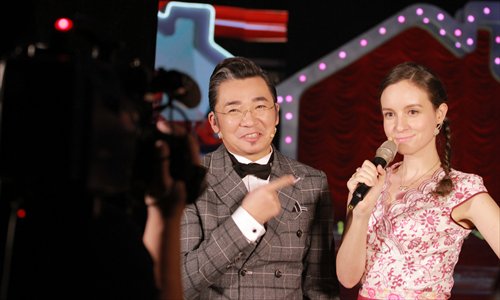For foreigners, Chinese talent and reality shows offer a chance to hit it big

Victoria Varadi performing in a sketch on a reality show hosted by China Central Television back in 2014 Photo: Courtesy of Victoria Varadi
When Marie Smurthwaite and her fellow band members - five women dressed in red coats and green trousers with scarves holding back their hair - first stepped onstage in China Central Television's (CCTV) performance hall and launched into the opening bars of a Chinese folk song, they didn't know what the reaction would be. And then the audience burst into applause.
It was at that moment that Smurthwaite, who comes from Australia, knew that they had chosen the "weird but right" outfits for Xingguang Dadao (Avenue of Stars), one of China's leading talent shows.
"We felt a bit embarrassed stepping on stage dressed like farmers, but when we started our performance, the audience's reaction was great and they were very passionate," Smurthwaite recalls.
Smurthwaite and her band Wuzhou Lamei (which literally translates to "spicy girls from five continents") ended up becoming the show's champions in June 2012. Back then, the band consisted of singers from Australia, China, France, Canada and Uganda.
"We're proud of ourselves and our performances," said Smurthwaite.
Though back then, Wuzhou Lamei was one of the few "exotic" acts to show up on Chinese TV shows, in recent years more and more foreigners have begun jumping on the bandwagon, eager to show off their talents on numerous Chinese talent and reality programs.
Zhao Tong, director of the Theory Department at the China Television Artists Association, wrote in an August 2015 article in the Guangming Daily that, in contrast to before, foreigners "are not just passers-by [on Chinese TV], but becoming frequent callers… The increasing number of foreigners participating in Chinese entertainment shows reflects the changes in the Chinese TV scene. As there are too many homogenized TV shows and highly repetitive guests, the inclusion of foreign faces adds something different."

Wuzhou Lamei dancing and singing onstage as part of a commercial Chinese show Photo: CFP
Taking the stage
When Smurthwaite first came to China in 2009, she started out as an English teacher. Soon, though, she started indulging her passion for the stage by joining several acting clubs in Beijing. There, she met her future boss, who later founded the band.
"I didn't know much about Xingguang Dadao and Chinese talent shows at that time. I was just told we should do this," she admits.
Compared with televised talent shows in Australia, she told Metropolitan that "Xingguang Dadao is different and operates in a very Chinese style."
"In my country, most participants sing pop songs on talent shows. But in Xingguang Dadao, the audiences like folk songs, red songs and traditional Chinese opera," she said, adding that she personally likes rock music.
In an effort to cater to their audience, the band practiced Chinese songs. "The language did bring some obstacles," Smurthwaite says. "One of our band members did not speak Chinese at that time, but she managed to learn the lyrics. As foreigners participating in Chinese talent shows, if we didn't sing in Chinese, the audiences would think we were too arrogant."
For Smurthwaite, the most difficult part was not the language, but being asked to put on a strange uniform and sing red songs whose lyrics she barely understood.
"We were not being our true selves onstage. But on the other hand, I did enjoy most performances," she said.
Another foreigner who launched her career on Chinese TV is actress and media personality Victoria Varadi, who got her start through Chinese Bridge, a Chinese speaking competition co-hosted by Hunan Satellite Television and the Confucius Institute.
After winning first place in the Hungary branch of the competition back in 2009, Varadi was invited to join 119 other participants from 60 countries for the contest in China.
Throughout the month-long competition, she showed off her language skills and related talents like singing Chinese songs, acting in short sketches and even singing Peking Opera.
"It was hard to learn Peking Opera in just three to four days, but it was very interesting. Those shows target Chinese audiences, so they want foreigners to exhibit traditional Chinese culture," said Varadi, who ended up winning second prize in the final competition.
Ushering in new opportunities
Varadi, who was then a student majoring in international trade in her home country, says her life completely changed after the talent show.
"I was granted a scholarship afterward that enabled me to study in China, and I also got some fame out of it. I was then constantly invited to different Chinese TV shows," she said, adding that these were opportunities she never expected when she first agreed to appear on the show.
"I enjoyed acting back in Hungary," says Varadi. "I have to say, participating in the Chinese Bridge competition helped pave the way for my future acting career in China."
Since then, Varadi has appeared in a number of soap operas, musicals and movies, even playing the starring roll in the film Anne Qionghai (2014).
Smurthwaite, meanwhile, has become a frequent guest on Chinese reality and talent programs since participating in Xingguang Dadao.
"I didn't want an ordinary job, sitting in the office from nine to five," she said. "The talent show made my dreams come true. I can now make enough money from performances to live on, which is the life that I always wanted to live."
Thanks to her band, Smurthwaite has gotten the chance to travel all over China on tour, and says that in addition to her singing career, she also hosts a travel program.
While talent is important, Varadi says that most Chinese TV shows select foreigners based on their ability to speak Chinese.
A fluent Chinese speaker herself, Varadi said that she is "looking forward to more challenges than this."
"I like film," she said. "I hope in the future I can have the chance to talk about films in front of an audience and also if possible, I would like to host a cultural show."
Cultural fusion and interaction
When the Canadian crosstalk comedian Mark Rowswell, who is best known by his Chinese name Dashan, first appeared in CCTV's Spring Festival Gala in 1988 - a yearly special that draws hundreds of millions of viewers - he was an immediate hit, arousing nationwide attention with his combination of exotic looks and fluent Chinese. A number of foreigners like Mike Sui have followed in his footsteps on the Chinese Internet thanks to their ability to speak fluent Chinese.
"These foreigners know that appearing on TV can bring them benefits," Zhao wrote in his Guangming Daily article. "It's a win-win for both them and the TV stations." He stressed that the year 2015 saw the greatest concentration of foreigners on Chinese TV.
In March, for example, six South Korean stars performed on Dinggelongdongqiang, a CCTV reality show; in April, 11 foreigners of different nationalities appeared on the popular talk show A Bright World, where they got the chance to express their opinions on a variety of topics in Chinese; and in July, Canadian star Christopher Downs participated in the reality show Where Are We Going, Dad?
Zhao noted that nowadays, foreigners with a greater variety of backgrounds are participating in Chinese shows, including those who have been working in China for many years, those who were born and raised in China and those who married Chinese men or women.
"Over the past decade, we've exhausted ideas for introducing Chinese TV shows overseas. Recruiting foreigners for Chinese entertainment shows may provide a solution," he said in the article, noting that some American films have likewise begun implanting Chinese elements to make them more attractive in the Chinese market.
Smurthwaite said that she thinks the increasing number of foreigners appearing on Chinese talent and reality shows is a positive thing. "I don't think this is a competition. In past years, if you were a foreigner, it was easy to score a gig onstage, but now you need to be really talented to win over audiences. I think this will urge people on to work harder."
It can also have a positive impact on China's growing expat community. "As there are more and more foreigners living in China, having more foreigners participating in TV shows can help the foreign community as a whole. As Chinese audiences become more familiar with foreigners on TV, they're more likely to see us as people rather than as different creatures and point at us as we walk down the street."
According to the Center for China and Globalization's Annual Report on Chinese International Migration (2015), there were around 848,500 foreigners living in China in 2013.
"We [foreigners] want to get involved in Chinese society. I hope that through these shows Chinese people will get rid of the misunderstanding that foreigners don't know Chinese or Chinese culture," she added.
For Smurthwaite, another thing foreigners can do on Chinese TV shows is talk about their own countries and cultures. "We can bring our cultures here too and help expand Chinese people's views of the world."
Newspaper headline: Shooting for the stars